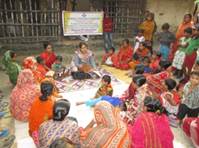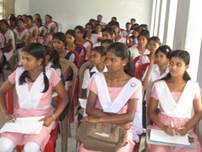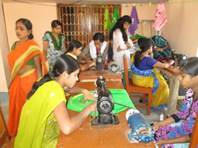Background
The districts of Jalpaiguri, North 24-Parganas share its border with Bhutan, Bangladesh, thus facilitating intense cross-border trafficking. Most in the community live below the poverty line and the area is infested with anti-social elements. There is a strong prevalence of gender discrimination. A remarkable percentage of women are working as domestic helps in larger cities. Young girls are trafficked to larger cities and forced into prostitution or to work as bar dancers. Recent news revealed that women aged between 14 to 24 years are trafficked through fake marriages and children are being kidnapped.
The high vulnerability of the targeted community is primarily due to poverty, inadequate education and awareness, high birth rates, and lack of appropriate community action and distance from the enforcement machinery. The majority of the families are unaware of the prevalence of trafficking in their region. In addition, local government, police, and border security officials lack the background information to effectively deal with traffickers, their victims, and at-risk women and children.
Objectives :
The project aims to :-
Project area : Swarupnagar block, North 24-Parganas district, Rajgunge and Sadar blocks in Jalpaiguri district. The 2 districts share its border with Bangladesh, Nepal and Bhutan, thus facilitating intense cross border trafficking.
Beneficiaries : Vulnerable, prone to trafficking women and children
Achievements
Awareness generation activities :
Skill Development Training programmes :
Women’s Interlink Foundation in joint collaboration with Tepul Mirzapur Gram Panchayat organized a training programme on embroidery for vulnerable girls. 14 trainees are undergoing training. With the completion of 1st phase starting from October, 2013 they are capable of doing embroidery on pillow cover, table cover. The training continued for another 2 months even after the completion of 6 months till May, 2013. By that time they are able to do embroidery on blouse which is of high demand in local market. The trainees after completion of this course will be able to start their own business and take orders on their own – a step that will pave the way towards self-reliance.
Support to victim/vulnerable woman
In the last 6 months 5 beneficiaries – 4 victims and 1 vulnerable woman were given tailoring orders to prepare goods as per demand. Since all of them have sewing machines, they were provided with raw material from WIF and a channel from the local market to supply orders.
The beneficiaries are now successfully preparing churidars, nighties, petticoats and earning on an average of Rs 1000/- to 1500/- per month.
In Nijoloy home, Jalpaiguri 10 victims are given beautician training. The training commenced from February, 2013 and continued till May, 2013. WIF will try to give placement in various beauty parlours to those who will excel in this course.
IEC Material
170 diaries, 20 banners, 160 pamphlets, 2000 calendars
WIF distributed the above materials to different Panchayats, police stations, SHGs, Kishori groups, school students. The IECs contain full contact details of WIF so that it can be reached immediately in need. The calendar also contains contact details of NIJOLOY Home where any rescued woman or child can be sent to WIF’s home for shelter and rehabilitation. There are few such cases in North 24-Parganas Nijoloy Home.
Networking :
WIF with its team of field workers is in constant touch with the local 4 Panchayats, local police stations, local CBOs. It is relied upon in the community and people try to follow the guidelines showed by WIF to ward off trafficking which is a growing menace both in North 24-Parganas and Jalpaiguri. Recently ‘Simanta Bangla’, a local CBO has requested for giving tailoring training support to 3 victim girls. 1 has been given support.



We believe in developing and working with networks at community, national and international levels with a rights based approach.